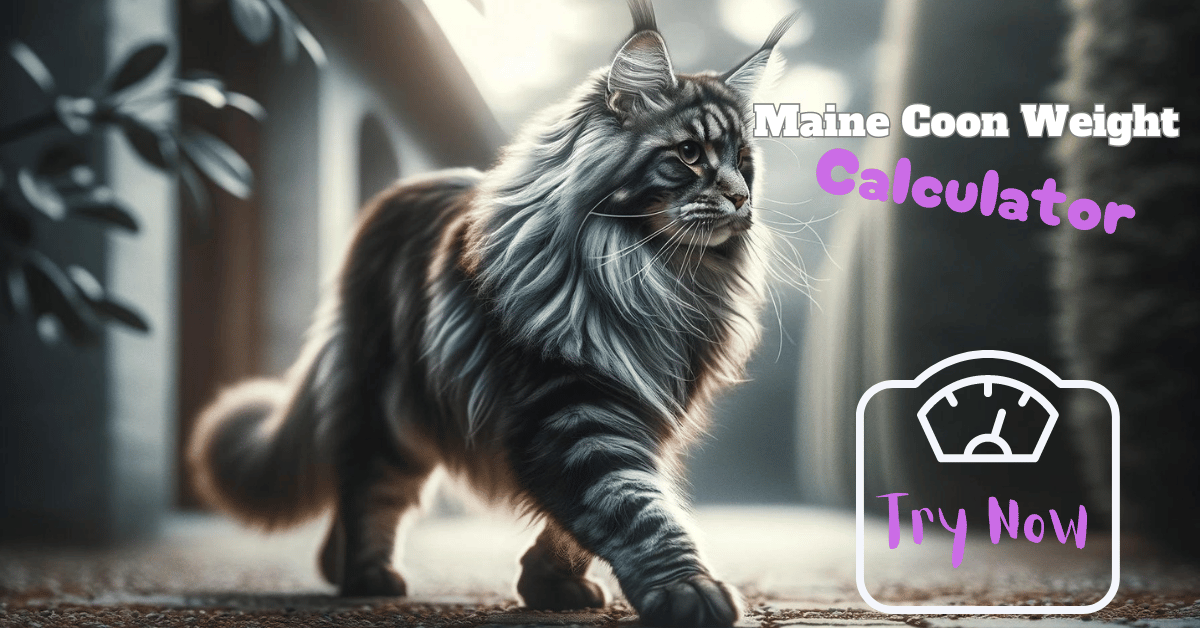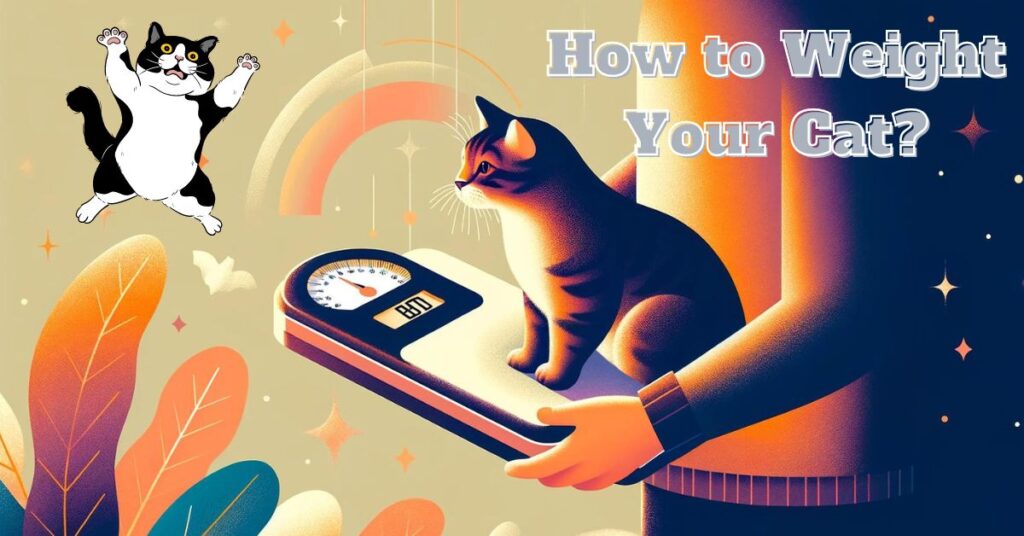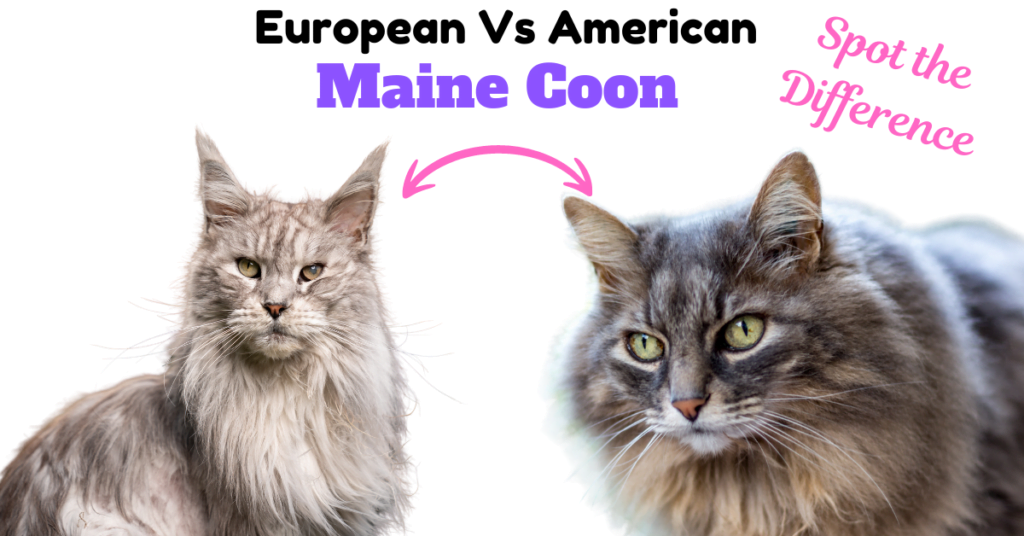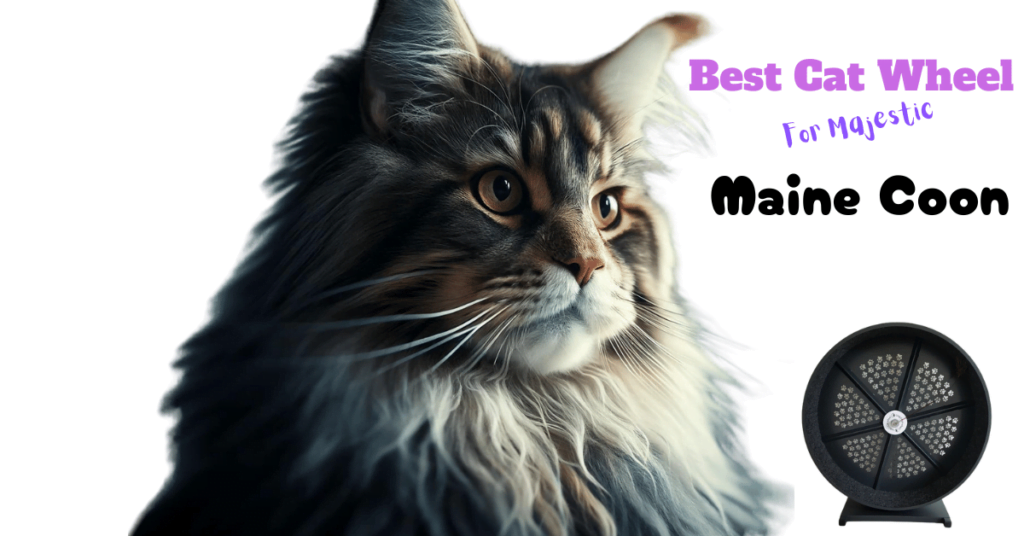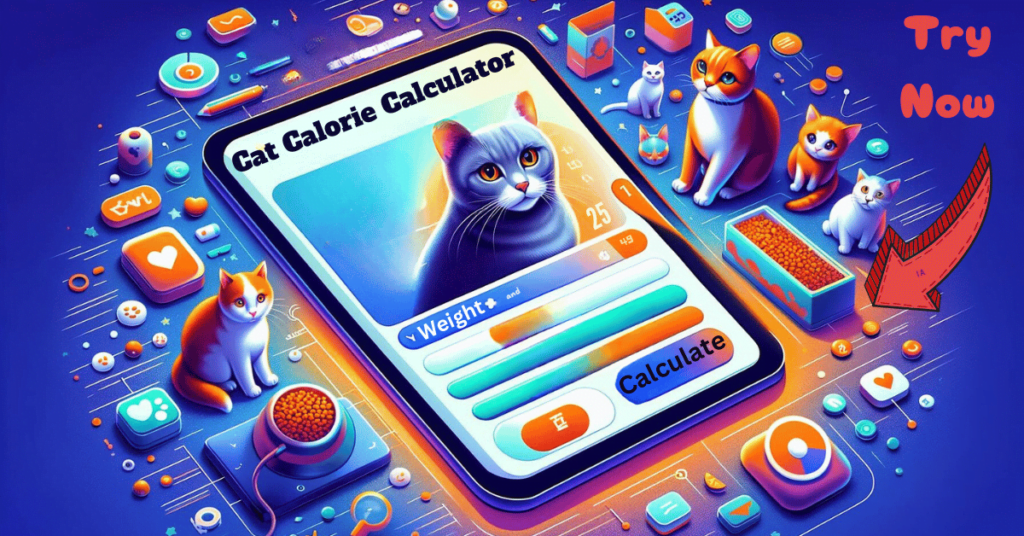How the Maine Coon Weight Calculator Works
- Selecting the Unit of Measurement: Click on “Lbs” or “Kgs” to choose your preferred weight unit.
- Enter Cat Details: Select the sex of your Maine Coon, then enter its age. You can choose to input information in either or both sections of the age category; the sex selection is mandatory.
- The Results: An estimated weight range based on the input age and sex. Note that this range is an approximation, not an exact measurement.
Maine Coon Cat Weight Calculator
Understanding Maine Coon Weight Results: Beyond the Numbers
After using the Maine Coon Weight Calculator, it's important to interpret the results within context. While the calculator provides estimated weight ranges, it's essential to recognize that no cat is the same. Various factors, including genetics, diet, and activity level, can influence a Maine Coon's weight.
While weight serves as a good indication of your cat's health, it's crucial to consider other factors, such as body condition score. If your Maine Coon's weight is close to or above the estimated range, visually assessing its body condition is imperative. A body condition score of 4 or higher indicates potential overweight or obesity, while a score below 4 may suggest underweight.
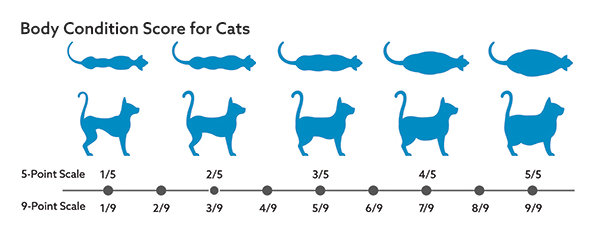
Maine Coon Weight Averages
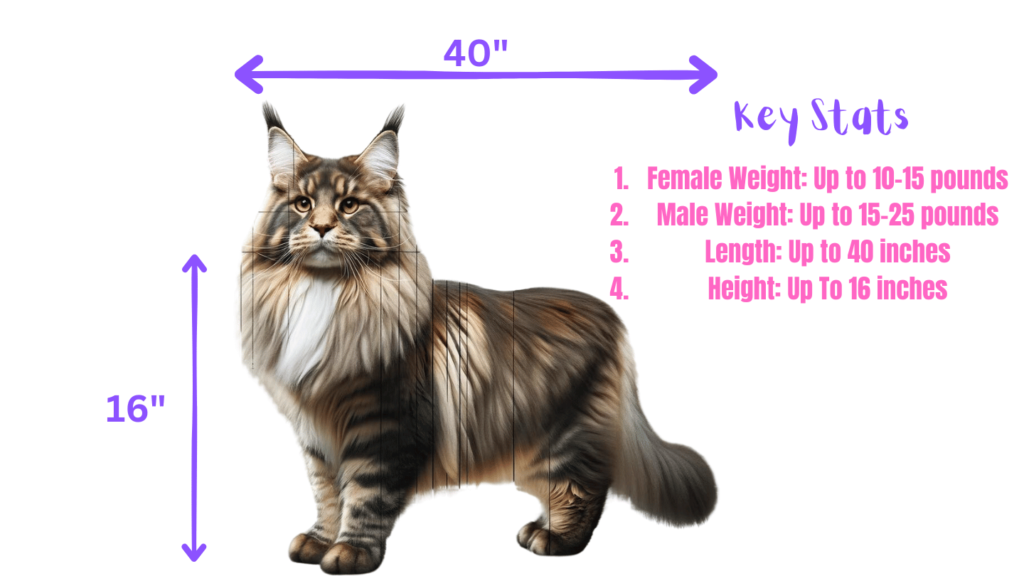
Maine Coon cats, renowned for their majestic size, present a remarkable range in weight, with females growing up to 10-15 pounds and males achieving a more robust 15-25 pounds. These felines are not just about weight; males can stretch up to an impressive 40 inches in length and stand at a height of 16 inches, embodying the true essence of feline grandeur.
The breed's size potential was spectacularly showcased by Mymains Stewart Gilligan, also known as Stewie, who clinched a spot in the Guinness World Records as the longest cat, measuring an astounding 48.5 inches.
Key Factors Influencing Maine Coon Weight and Growth
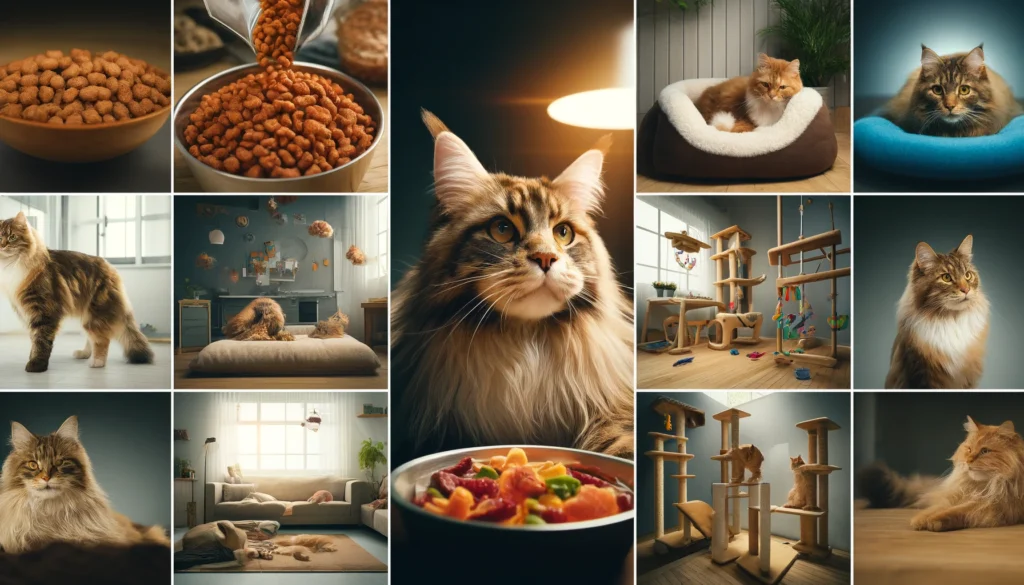
1. Diet: The Foundation of Feline Health
When it comes to feeding a Maine Coon, think of yourself as the Michelin-star chef of the feline world. These gentle giants thrive on a balanced, high-protein diet that fuels their epic growth and maintains their luxurious mane. Here's the dish:
- Protein Power: Aim for meals that list meat, poultry, or fish as the first ingredient. Maine Coons are carnivores by nature, so their menu should mimic what they'd munch in the wild.
- Portion Control: Even kings and queens need to watch their waistline. Use feeding guides as a starting point but adjust based on your cat's activity level and weight goals.
- Hydration Station: Wet food plays a double role by providing both hydration and nutrition. Keep fresh water available at all times, too, because staying hydrated is as important as the diet itself.
2. Sleep: The Unsung Hero of Health
In the kingdom of Maine Coons, sleep is not for the lazy—it's for the wise. These feline royals need up to 16 hours of shut-eye to support their growth and health. Here’s why slumber is golden:
- Growth Hormone Galore: During deep sleep, Maine Coons release growth hormones. It's like their body's own magic spell for growth and repair.
- Immunity Boost: A well-rested Maine Coon is a fortress against illness. Sleep bolsters their immune system, keeping pesky invaders at bay.
- Energy Recharge: After a good day's rest, they're ready to pounce, play, and patrol their kingdom with vigor.
Make sure your Maine Coon's sleeping quarters are as comfy as their throne, away from the hustle and bustle, to support their royal rest.
3. Genetics and Regional Influences
Genetic lineage and parental heritage play a crucial role in determining the size and weight of Maine Coon cats, adding to the breed's diverse characteristics. Variations in size and weight can arise from the specific genes passed down from their parents, leading to noticeable differences even among cats within the same geographic region.
Beyond these genetic influences, regional breeding practices further shape these distinctions. For instance, European Maine Coons often have a bulkier and more robust physique, reflecting regional aesthetic preferences. In contrast, breeders in America might favor a sleeker and more refined build for American Maine Coons.
4. Activity and Playtime: Keeping Your Giant Agile
A Maine Coon without play is like a kingdom without joy—unthinkable! These majestic creatures may look like they belong on a luxurious pillow, but they have energy to burn. Here’s how to keep your giant agile and entertained:
- Interactive Toys: Engage their hunter instincts with toys that mimic prey movements. Feather wands and laser pointers can provide hours of kingdom-worthy entertainment.
- Climbing and Exploring: Maine Coons love to survey their domain from the highest vantage points. Cat trees and shelves encourage climbing, offering both exercise and a room with a view.
- Puzzle Feeders: Combine mealtime with playtime. Puzzle feeders make your Maine Coon work for their food, stimulating their mind and keeping their body active.
- Cat Wheel: A cat wheel provides a unique and engaging way for your Maine Coon to expend energy, but it also offers significant health benefits, including weight management and reducing boredom.
Pro Tip: With the measurements in hand, you can easily find the best cat wheel size using our Cat Wheel Size Calculator.
Monitoring and Managing Your Maine Coon’s Weight
The Importance of Regular Check-Ins
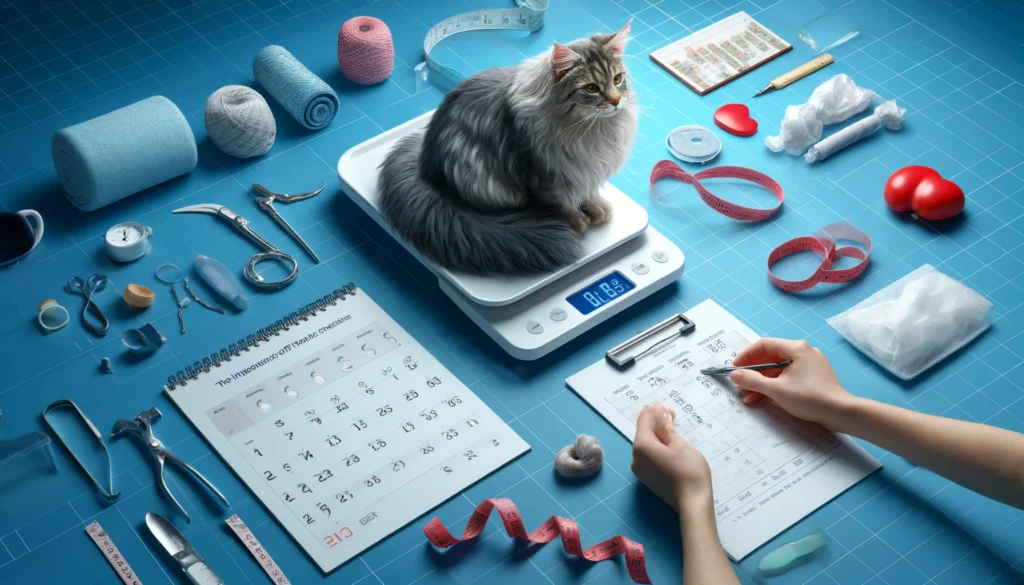
Think of monthly weigh-ins and measurements as your Maine Coon's personal health audit. It's not about critiquing their royal fluffiness but ensuring they're thriving. Here’s the scoop:
- Set a Date: Mark your calendar for a monthly weigh-in. Consistency is key to tracking your Maine Coon's growth and health effectively.
- Use the Right Tools: A pet scale for weight and a fabric measuring tape for body measurements are your go-tos. Remember, accuracy is royalty.
- Measuring and weighing: Compare your Maine Coon's actual weight to the estimated range provided by our Maine Coon Weight Calculator, based on their age and sex. For length, reference breed standards to ensure your Maine Coon is growing accordingly.
Creating and Maintaining a Growth Chart
A growth chart for your Maine Coon is more than numbers on a spreadsheet; it’s a chronicle of their journey to majestic maturity. Here’s how to start this epic saga:
- Spreadsheet Setup: Open a new spreadsheet. Label columns for date, weight, length, and height.
- Regular Entries: After each weigh-in, record the numbers. Add notes on diet changes, activity levels, or health notes.
- Visualize Progress: Many spreadsheet programs can transform data into charts. Watching your Maine Coon’s growth curve can be as satisfying as the plot twist in a royal drama.
Actionable Steps for Weight Management
Navigating Underweight Challenges
Is your Maine Coon not filling out their royal robes? Here’s how to address the issue:
- Signs to Watch For: Visible ribs, lack of muscle mass, and less energy can indicate your Maine Coon might be under the weather weight-wise.
- Possible Causes: It could be dietary, or there might be underlying health issues. Time for a detective hat!
- Action Steps: Review their diet for calorie and nutrient sufficiency. Consider more frequent or richer meals. And, a vet visit is a wise move to rule out or address health issues.
Addressing Overweight Concerns
If your Maine Coon is more fluff than buff, it’s time for a gentle intervention:
- Recognizing the Signs: Difficulty in feeling the ribs, a saggy belly, and a lack of waistline are tell-tale signs.
- Health Risks: Excess weight can lead to serious health issues, from diabetes to joint problems.
- Strategies for Weight Loss: Incorporate more playtime to get them moving. Review their diet with your vet, focusing on portion control and nutrient balance. Slow and steady wins the race.
Maintaining Optimal Weight
Even when your Maine Coon strikes a perfect balance in weight and showcases health in every sleek stride and vibrant gaze, the journey doesn't pause there. Think of optimal health as a continuous adventure, not just a destination. Keeping your regal companion active, indulging them in a well-crafted diet, and sticking with regular check-ins form the cornerstone of preventative care.
After all, the best way to address a problem is to ensure it never becomes one in the first place.
Weighing in on Maine Coon Health: Our Final Thoughts
Understanding and managing your Maine Coon’s weight is about enriching their lives. Regular weigh-ins, a tailored diet, sufficient sleep, and plenty of playtimes are the pillars of a healthy lifestyle.
Use the Maine Coon Weight Calculator as your guide, and remember, every step you take towards managing their weight is a step towards a healthier cat.

